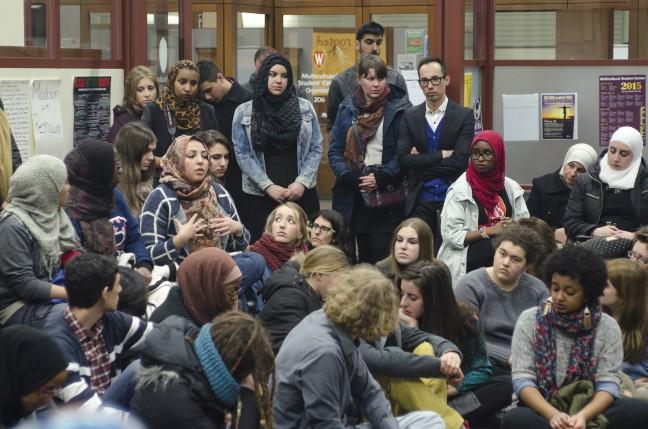University of Wisconsin’s Muslim Student Association hosted a panel Thursday evening addressing issues of Islam and race in the wake of a tragedy in North Carolina, in which three young Muslim university students were murdered.
More than one hundred people filled a lecture hall in Sterling Hall to hear a talk from Dawud Walid, the executive director of the Michigan chapter of the Council on American-Islamic Relations and Linda Sarsour, the national advocacy director for the National Network for Arab American Communities.
Joshua Johnson, the assistant dean and director of UW’s Multicultural Student Center, moderated the event. He stressed the importance of having similar events to educate and raise awareness on issues public universities are often afraid to talk about, such as religion.
“Religion is a huge part of any college student’s life,” Johnson said. “If we ignore it, we’re not fully serving the students.”
The panel discussed issues of equality, Islam’s views on social justice and how students can partake in matters of social justice. During his speech, Walid quoted verses from the Quran and stressed the importance of human beings sharing a common interest, making them equal.
Sarsour opened her speech by urging Muslim students to be proud of who they are. She encouraged students to take part in social justice issues, whether by volunteering at a homeless shelter or simply showing up to a fellow student organization’s event to show support.
“Be present,” she said. “It’s about building meaningful relationships.”
Sarsour emphasized the importance of human equality. She said the issues many people face are not just Muslim issues, but human rights issues.
Immediately following the panel, a vigil was held in the Multicultural Student Center for the victims of the North Carolina shooting. Students and residents of Madison from all walks of life attended to show support for the Muslim community and stand in solidarity against hate crimes.
Individuals gathered in circles to share their feelings on the event, words of hope and issues they have faced because of their religious identity.
Jessica Franco Morales, a sophomore at UW and self-described woman of color, said though she herself does not identify as Muslim, it was still very important for her to attend the events put on by the MSA to show solidarity.
“People of color are dehumanized in every single way possible,” Franco Morales said. “Muslims are criminalized and viewed as terrorists, Latinos are ‘aliens,’ and black lives to our justice system don’t matter.”
Toward the end of the vigil Sarsour asked each individual in the room to give one word or phrase to describe how they felt at the moment. Responses ranged from “sad” and “lost,” to “hopeful” and “ready to fight.”
As a dean, Johnson said he gained valuable information from both the panel and the vigil in terms of what students need. He said the issues discussed at the event extend far beyond just one campus, racial or religious group.
“This is a big issue for a lot of people on campus,” Johnson said.
Johnson, who has specialized training in creating hate crime protocols on college campuses, said there is a system in place at UW through which students can report bias incidents. However, he noted many students simply are not aware of its existence.
Johnson said the next step in combating issues of discrimination on campus is promoting the bias incident reporting system.
“We want people to know that this is not acceptable in our community,” Johnson said. “Discrimination or bias of any kind needs to be addressed, but it’s sometimes hard to address if it’s not reported.”


